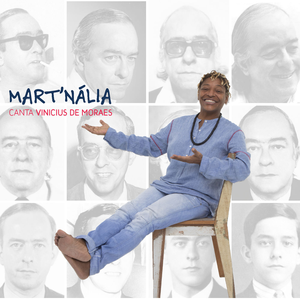Maria Vai Com As Outras
Mart'nália Lyrics
Jump to: Overall Meaning ↴ Line by Line Meaning ↴
Prá turma lá do Gantois
Era Maria vai com as outras
Maria de coser, Maria de casar
Porém o que niguém sabia
É que tinha um particular
Além de coser, além de rezar
Tumba é caboclo
Tumba lá e cá
Tumba é guerreiro
Tumba lá e cá
Tumba é meu pai
Tumba lá e cá
Não me deixe só
Maria que não foi com as outras
Maria que não foi pro mar
No dia dois de fevereiro
Maria não bincou na festa de Iemanjá
Não foi jogar água de cheiro
Nem flores pra sua Orixá
A Iemanjá pegou e levou
O moço de Maria para o mar
Tumba é caboclo
Tumba lá e cá
Tumba é guerreiro
Tumba lá e cá
Tumba é meu pai
Tumba lá e cá
Não me deixe só
Até hoje ainda se fala
das rodas lá do Gantois
Que triste era de ver Maria
na sala onde ela ia
pra se manisfestar
A gente ainda se admira
seu gira-gira sem parar
Maria girou! Deixaram girar
E a turma não parava de cantar:
Tumba é caboclo
Tumba lá e cá
Tumba é guerreiro
Tumba lá e cá
Tumba é meu pai
Tumba lá e cá
Não me deixe só
Adicionar à playlist
Tamanho
A
A
Cifra
Imprimir
Corrigir
Composição: Toquinho / Vinicius
The song "Maria Vai Com As Outras" by Mart'nália tells the story of a woman named Maria who is described as a good girl from Gantois. She is known for always going along with others and conforming to societal expectations. She is described as a woman who sews and marries, implying that she follows traditional gender roles and expectations.
However, the lyrics reveal that there is more to Maria than meets the eye. It is hinted that she has a secret or a hidden side that nobody knows about. Aside from sewing and praying, Maria is also described as a woman who indulges in sinning. This suggests that beneath her seemingly obedient exterior, Maria has desires and a rebellious nature that she suppresses.
The chorus of the song introduces the phrase "Tumba é caboclo," which is a reference to an Afro-Brazilian spiritual practice called Umbanda. Tumba is believed to be a spirit or deity, often associated with the ocean and strength. The repetition of this phrase emphasizes the power and presence of Tumba, and it serves as a plea for this spiritual entity to not leave the singer alone.
The song then tells the story of Maria refusing to go with the crowd and join in the festivities of Iemanjá, the goddess of the sea. While others partake in traditional rituals such as playing with scented water and offering flowers to their deities, Maria chooses to abstain. In a twist of events, it is revealed that Iemanjá takes a liking to Maria and takes her lover away to the sea.
The lyrics end by describing how Maria's actions at Gantois continue to be talked about. Her constant spinning and dancing in the gathering room astonish and captivate those around her. The repetition of the phrase "Tumba é caboclo" serves as a reminder of the power and strength that Maria possesses, and it also pleads for her not to be left alone.
Overall, the lyrics of "Maria Vai Com As Outras" explore themes of conformity, hidden desires, spirituality, and the power of individuality. Maria serves as a symbol of resilience and rebellion against societal expectations, while also inspiring intrigue and admiration from those who witness her self-expression. The repetition of "Tumba é caboclo" adds a spiritual and mystical element to the song, invoking a sense of strength and protection.
Line by Line Meaning
Maria era uma boa moça
Maria was a good girl
Prá turma lá do Gantois
For the group from Gantois (a religious community)
Era Maria vai com as outras
She was Maria who goes with the others
Maria de coser, Maria de casar
Maria who sews, Maria who marries
Porém o que niguém sabia
However, what nobody knew
É que tinha um particular
Is that she had a secret
Além de coser, além de rezar
Besides sewing, besides praying
Também era Maria de pecar
She was also Maria who sins
Tumba é caboclo
Tumba is a spirit of the Afro-Brazilian religion Candomblé
Tumba lá e cá
Tumba here and there
Tumba é guerreiro
Tumba is a warrior
Não me deixe só
Don't leave me alone
Maria que não foi com as outras
Maria who didn't go with the others
Maria que não foi pro mar
Maria who didn't go to the sea
No dia dois de fevereiro
On February 2nd
Maria não bincou na festa de Iemanjá
Maria didn't play at the party of Iemanjá (goddess of the sea)
Não foi jogar água de cheiro
She didn't go to sprinkle perfumed water
Nem flores pra sua Orixá
Nor flowers for her deity
A Iemanjá pegou e levou
Iemanjá took and carried away
O moço de Maria para o mar
The young man from Maria to the sea
Até hoje ainda se fala
Until today people still talk
das rodas lá do Gantois
about the gatherings there in Gantois
Que triste era de ver Maria
How sad it was to see Maria
na sala onde ela ia
in the room where she used to go
pra se manisfestar
to manifest herself
A gente ainda se admira
We still admire
seu gira-gira sem parar
her non-stop spinning
Maria girou! Deixaram girar
Maria spun! They just let her spin
E a turma não parava de cantar
And the group continued singing
Tumba é caboclo
Tumba is a spirit of the Afro-Brazilian religion Candomblé
Tumba lá e cá
Tumba here and there
Tumba é guerreiro
Tumba is a warrior
Não me deixe só
Don't leave me alone
Lyrics © O/B/O APRA AMCOS
Written by: Vinicius De Moraes, Antonio Pecci Filho
Lyrics Licensed & Provided by LyricFind
